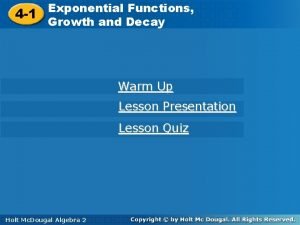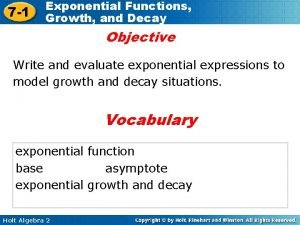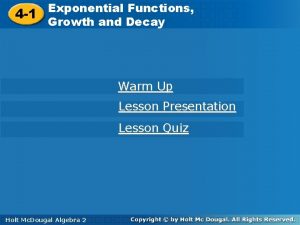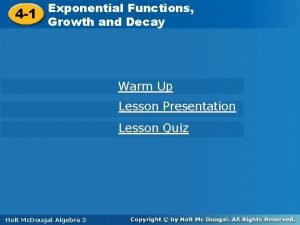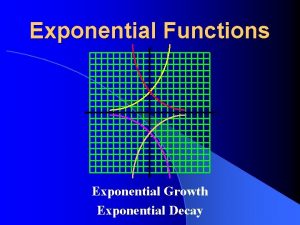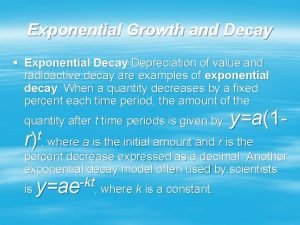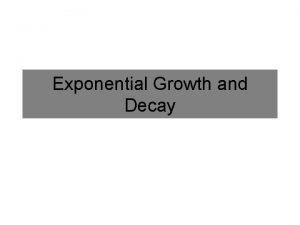Applications of Exponential Functions Growth Decay There are







- Slides: 7

Applications of Exponential Functions - Growth & Decay • There are many applications of exponential functions in the areas of growth and decay. Growth Model Decay Model Table of Contents

Applications of Exponential Functions - Growth & Decay • Example 1: Consider the model representing the amount of decay of carbon-14, where. . . t = time in years A 0 = initial amount of carbon-14 A(t) = amount of carbon-14 after t years Assume that a bone originally had 20 grams of carbon-14 present. How many grams will be present 1000 years later? Table of Contents

Applications of Exponential Functions - Growth & Decay • Letting A 0 = 20 and t = 1000 yields. . . or approximately 17. 72 grams of carbon-14 remaining. Table of Contents

Applications of Exponential Functions - Growth & Decay • Example 2: Consider the model where. . . t = time in weeks N(t) = is the number of people who have the flu in a certain state t weeks after the initial outbreak. Find the following: a) the number of people ill with the flu when the epidemic began. b) the number of people ill with the flu after 3 weeks. c) the total number of people with the flu at the end of the epidemic. Table of Contents

Applications of Exponential Functions - Growth & Decay • The most efficient way to answer the questions would be to use the TABLE feature on a graphing calculator. Type in the formula into y 1, set TBLSET to 0, 1, auto, and then go to TABLE. Table of Contents a) Letting t = 0 represent the beginning of the epidemic, there were approximately 150 people ill with the flu initially.

Applications of Exponential Functions - Growth & Decay b) A value of t = 3 represents the number of people ill after 3 weeks, or approximately 30, 128 people. c) To find the total number of people with the flu at the end of the epidemic, consider what value N(t) is approaching as the value of t increases. Scrolling down in the table yields. . . which suggests 60, 000 people. Table of Contents

Applications of Exponential Functions - Growth & Decay Table of Contents
 7-1 exponential functions growth and decay
7-1 exponential functions growth and decay 7-1 exponential functions growth and decay
7-1 exponential functions growth and decay Exponential growth and decay worksheet doc
Exponential growth and decay worksheet doc How to tell if a function is decay or growth
How to tell if a function is decay or growth 7-1 exponential functions growth and decay
7-1 exponential functions growth and decay 4-1 exponential functions growth and decay
4-1 exponential functions growth and decay 4-1 exponential functions growth and decay
4-1 exponential functions growth and decay Exponential functions growth and decay
Exponential functions growth and decay

